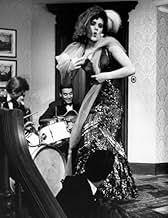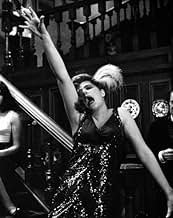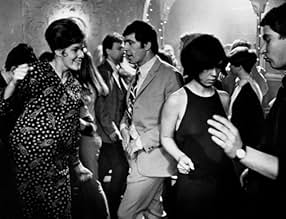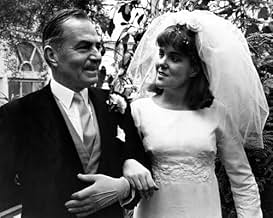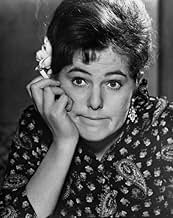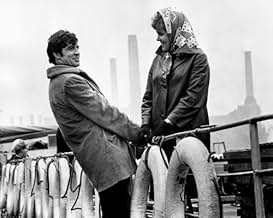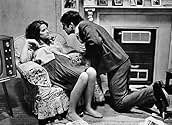NOTE IMDb
6,9/10
4,5 k
MA NOTE
Une fille traditionnelle résiste aux avances d'un échangiste qui la veut comme maîtresse dans le Londres des années 1960.Une fille traditionnelle résiste aux avances d'un échangiste qui la veut comme maîtresse dans le Londres des années 1960.Une fille traditionnelle résiste aux avances d'un échangiste qui la veut comme maîtresse dans le Londres des années 1960.
- Réalisation
- Scénario
- Casting principal
- Nommé pour 4 Oscars
- 6 victoires et 17 nominations au total
Jolyon Booth
- Registry Office Clerk
- (as Jolyan Booth)
Lewis Alexander
- Party Guest
- (non crédité)
Jack Arrow
- Party Guest
- (non crédité)
Richard Atherton
- Waiter
- (non crédité)
Roy Beck
- Party Guest
- (non crédité)
Hyma Beckley
- Party Guest
- (non crédité)
Avis à la une
I enjoyed "Georgy Girl" at the time of its original release, but hadn't thought about it until I recently viewed the DVD version. This revisit was well worth it: "Georgy Girl" is a delightful film.
Charlotte Rampling's Meredith is my favorite of the four main characters. Rampling has always been physically stunning, but it's her moody intellect within that keeps Meredith modern rather than a 60s icon who looks sensational in Mary Quant mini-dresses, a darker version of Julie Christie in "Darling" (a character who didn't have too much of a light side herself). Meredith is cool, in control, self-serving, brutal, and surprisingly honest about who she is. "You take me as me," she tells Jos (Alan Bates) as she cajoles him into marrying her, not so much because she's pregnant but because she's bored. It seems in Meredith's view, you can easily get rid of a pregnancy, but boredom requires more skill and is potentially a worse situation in which to find yourself. Other actresses could have successfully made Meredith a bitch, but Rampling makes her fascinating and thus strangely likable. When she exits the film, things go a bit limp, but then there's little left than to move the story to its inevitable conclusion.
Alan Bates plays Jos with such high physical and verbal energy he seems to be all the Marx Brothers rolled into one. His facial expression at the culmination of his strip during the 'I Love You' sequence suggested to me a nod to the great Harpo.
Lynn Redgrave made the role of Georgy so much her own it's difficult to believe the story that Vanessa Redgrave had been originally intended for it -- and even more difficult to imagine Vanessa playing scenes with Rampling.
The title song became a big hit at the time. In the film, the lyrics vary somewhat from the pop version, serving to set up the plot during the opening credits and then comment on its resolution at the end. In between, the song politely vanishes, leaving the classically influenced score by Alexander Faris to take over with its harpsichord riffs and its subtle playfulness. I especially liked the violin solo that accompanies the transition from orgasm to morning sickness.
The dialogue is often fast, overlapping, thrown away, or contains obscure (to me) cultural references, so it's worth enabling the English subtitles for DVD viewing. You wouldn't want to miss "Moss Bros", or Alan Bates' rapid-fire disrobing monologue, or Meredith's contempt for the concert at which she has just played violin: "Beethoven night. They're like animals."
Charlotte Rampling's Meredith is my favorite of the four main characters. Rampling has always been physically stunning, but it's her moody intellect within that keeps Meredith modern rather than a 60s icon who looks sensational in Mary Quant mini-dresses, a darker version of Julie Christie in "Darling" (a character who didn't have too much of a light side herself). Meredith is cool, in control, self-serving, brutal, and surprisingly honest about who she is. "You take me as me," she tells Jos (Alan Bates) as she cajoles him into marrying her, not so much because she's pregnant but because she's bored. It seems in Meredith's view, you can easily get rid of a pregnancy, but boredom requires more skill and is potentially a worse situation in which to find yourself. Other actresses could have successfully made Meredith a bitch, but Rampling makes her fascinating and thus strangely likable. When she exits the film, things go a bit limp, but then there's little left than to move the story to its inevitable conclusion.
Alan Bates plays Jos with such high physical and verbal energy he seems to be all the Marx Brothers rolled into one. His facial expression at the culmination of his strip during the 'I Love You' sequence suggested to me a nod to the great Harpo.
Lynn Redgrave made the role of Georgy so much her own it's difficult to believe the story that Vanessa Redgrave had been originally intended for it -- and even more difficult to imagine Vanessa playing scenes with Rampling.
The title song became a big hit at the time. In the film, the lyrics vary somewhat from the pop version, serving to set up the plot during the opening credits and then comment on its resolution at the end. In between, the song politely vanishes, leaving the classically influenced score by Alexander Faris to take over with its harpsichord riffs and its subtle playfulness. I especially liked the violin solo that accompanies the transition from orgasm to morning sickness.
The dialogue is often fast, overlapping, thrown away, or contains obscure (to me) cultural references, so it's worth enabling the English subtitles for DVD viewing. You wouldn't want to miss "Moss Bros", or Alan Bates' rapid-fire disrobing monologue, or Meredith's contempt for the concert at which she has just played violin: "Beethoven night. They're like animals."
Georgy Girl is an amazing film that's was in the front of a new wave of more realistic, unblinking films by the Brits. The film doesn't flinch when depicting or talking about accidental pregnancy, abortion, mothers not interested in their babies. They're just a part of life, nothing to moralize about or to spotlight as big drama. Imagine any film from the U.S. in the mid 1960s taking on these issues at all, much less in the matter-of-fact way that Georgy Girl does. Georgy Girl and Darling strike me as two mid-60's British films that herald a new age--greater reality; women's freedom to choose partners and to define their romantic and sexual connections in their own way. Another very modern aspect of the film is the absence of any person taking the moral high ground; every character is on their own, and depicted irreverently, with warts, but also warmly.
Overall, I recommend this flick. I particularly liked the character of Georgy ...the way she tries to cover up any vulnerability with wit/ spunk..she MAKES the movie. But I can't help be bummed at the ending. Rationally, I approve of the ending, but find it disappointing at the same time..... It was more sensible,plausible and had more integrity than if they'd kept Georgy & Jos together...but...but... James Mason creeped me out through the whole movie (I mean, he watched her grow up..the old lecher!) and Alan Bates was soo ADORABLE (yes, he was selfish & immature too, I KNOW. He had potential for change??Maybe??) I supposed I'm just biased, Alan Bates (Alan Bates of the late '60s & '70s that is)being up there on my list of unconventional crushes.
I watched this movie mostly for Lynn Redgrave, expecting nothing more than an old, light-hearted British comedy. It was better than I expected; "Georgy Girl" is a lovely, bittersweet dramedy clearly inspired by American screwball comedies of the 30's and the French New Wave that was burning in the 60's (to see how much the Nouvelle Vague aesthetics influenced British cinema, check the also remarkable "Two for the Road", with Albert Finney and Audrey Hepburn).
Redgrave, fantastic as usual, plays Georgy, a scatter-brained working-class virgin with a golden heart. She shares a flat with a selfish, cold bitch (Charlotte Rampling), who gets pregnant of Jos (Alan Bates), and the three of them eventually move together; but things get complicated as Georgy is courted by Jos and James (James Mason), a much older man, at the same time.
Bates (is it just me, or does he look like Jean-Paul Belmondo - one of the greatest Nouvelle Vague icons because of Godard's "Breathless" - in this?), Rampling and Mason are all great in their respective parts, but this is Redgrave's show all the way. Her anti-heroine is sweet and memorable, somewhat similar to Toni Collette's Muriel Heslop (from "Muriel's Wedding"), some sort of a British, less patient and clumsier Amélie Poulain (Audrey Tautou). Georgy singing "Whole Lotta Woman" is a classic scene. Lynn's performance alone would make this movie worth seeing, but she's not the only good thing about it, just the core. 10/10.
Redgrave, fantastic as usual, plays Georgy, a scatter-brained working-class virgin with a golden heart. She shares a flat with a selfish, cold bitch (Charlotte Rampling), who gets pregnant of Jos (Alan Bates), and the three of them eventually move together; but things get complicated as Georgy is courted by Jos and James (James Mason), a much older man, at the same time.
Bates (is it just me, or does he look like Jean-Paul Belmondo - one of the greatest Nouvelle Vague icons because of Godard's "Breathless" - in this?), Rampling and Mason are all great in their respective parts, but this is Redgrave's show all the way. Her anti-heroine is sweet and memorable, somewhat similar to Toni Collette's Muriel Heslop (from "Muriel's Wedding"), some sort of a British, less patient and clumsier Amélie Poulain (Audrey Tautou). Georgy singing "Whole Lotta Woman" is a classic scene. Lynn's performance alone would make this movie worth seeing, but she's not the only good thing about it, just the core. 10/10.
Marvelous film, an extension of the British kitchen-sink dramas from earlier in the decade (but with a friskier spirit), "Georgy Girl" introduced audiences to Vanessa Redgrave's kid sister, Lynn (in an Oscar-nominated performance). She's plain and frumpy Georgina, a too-tall, kissless clown and nursery school teacher who plays second-fiddle to her more beautiful flat-mate--and who also harbors a crush on her pal's sexy boyfriend in the bargain. While dodging the advances of her father's wealthy employer, Georgina acts as nursemaid to her pregnant roommate, never dreaming of the circumstances to follow. From Margaret Forster's novel, which she co-adapted with Peter Nichols, the film is visually alive, stylish and skittering about with "free and easy" abandon, yet with moral choices and a sobering heart at its center. Redgrave is nothing short of fabulous; her "Georgy" is often slumped over sulking, an easy mark with little sense of humor (she's either completely inflexible or terribly over-eager). The clever, enticing writing is spread about for everyone to share in--so much so that the supporting characters nearly upstage our heroine (whose moods tend to be exasperating near the end): Charlotte Rampling is excellent as pregnant Meredith (who gets the film's most viciously funny lines); Alan Bates is terrific as her devilish lover; while Oscar-nominated James Mason is too comfortably cast as the older man with an eye for Georgy (he isn't able to offer anything fresh here). Delightful comedy-drama from director Silvio Narizzano, one of the few from this era not to use 'mod' touches to set the time and place. *** from ****
Le saviez-vous
- AnecdotesVanessa Redgrave backed out of the role of Georgy just before shooting started. Her sister Lynn picked up the part instead.
- GaffesIn the early scene at the piano where Georgy's father has brought her a dress to wear to a birthday party, she's wearing glasses when he starts to say, "Oh, please yourself," but not wearing them before he finishes the line.
- ConnexionsFeatured in The Lady with the Torch (1999)
Meilleurs choix
Connectez-vous pour évaluer et suivre la liste de favoris afin de recevoir des recommandations personnalisées
Détails
- Date de sortie
- Pays d’origine
- Langues
- Aussi connu sous le nom de
- Georgy - En ploygirl
- Lieux de tournage
- Dame Clara Butt House, 7 Harley Road, London, Greater London, Angleterre, Royaume-Uni(James Leamington's mansion)
- Société de production
- Voir plus de crédits d'entreprise sur IMDbPro
Box-office
- Budget
- 400 000 $US (estimé)
- Durée
- 1h 39min(99 min)
- Couleur
Contribuer à cette page
Suggérer une modification ou ajouter du contenu manquant


